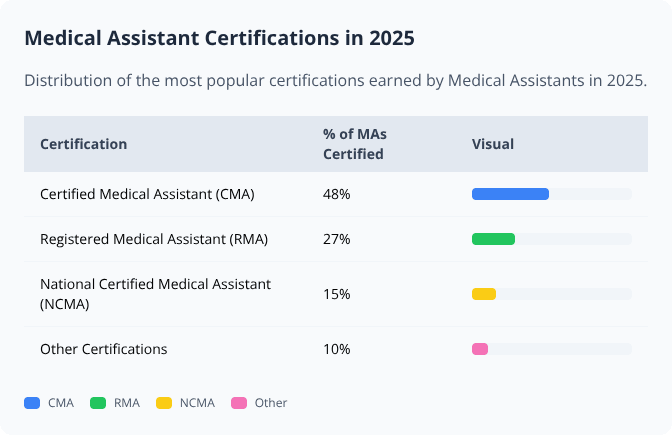Medical Assistant Resume Certifications

Certifications on a Medical Assistant resume aren’t just shiny badges—they’re golden tickets that prove you know your stuff. This article peels back the mystery on why those credentials matter and how to showcase them for maximum impact. Read on to learn how to make your resume pulse with promise.
How Certifications Boost Your Medical Assistant Resume
A certification flashes like a badge, instantly signaling to employers that a Medical Assistant knows their craft inside and out—no bluffing necessary. Credentials silence doubts, demonstrating not just classroom learning but real, hands-on competence in patient care and office know-how. In a sea of similar resumes, a certified candidate stands out, catching an employer’s eye like a spotlight on a dark stage. That little piece of paper can tilt the playing field just enough to open doors others might find locked.

Adding a certifications section to your resume can really boost your chances, especially for medical assistant jobs where proof of specific skills matters.
Must-Have Certifications for Medical Assistant
Certified Medical Assistant (CMA) – Widely recognized and valued, this credential from the AAMA signals to employers that a medical assistant meets national competency standards in both clinical and administrative skills.
Registered Medical Assistant (RMA) – Supported by the AMT, the RMA distinguishes professionals who have demonstrated knowledge and skills through rigorous examination and approved training programs.
National Certified Medical Assistant (NCMA) – Offered by the NCCT, this certification emphasizes hands-on competencies and is especially favored in certain regions and for those crossing into specialized practice areas.
Certified Clinical Medical Assistant (CCMA) – Focused primarily on direct patient care and clinical procedures, this NHA certification appeals to employers seeking confident front-line medical staff.
Certified Medical Administrative Assistant (CMAA) – Also from the NHA, the CMAA showcases expertise in the vital business and administrative aspects of healthcare, from scheduling to patient records.
Clinical Medical Assistant Certification (CMAC) – Provided by the AMCA, this credential verifies the breadth of a medical assistant’s skills, adding credibility for those working across both administrative and clinical roles.
Certified Healthcare Access Associate (CHAA) – Granted by NAHAM, the CHAA addresses the front-desk and patient access side, helpful for medical assistants looking to specialize or advance in healthcare administration.
DO'S
- List certifications near the top of your resume for immediate visibility.
- Include only current and relevant certifications specific to medical assisting.
- Clearly state the full certification name along with the issuing organization and expiration date.
DON'TS
- Don't list expired or irrelevant certifications.
- Don't forget to mention the certifying organization.
- Don't use confusing abbreviations instead of full certification names.
Pro Tip: Highlighting the most relevant certifications on your Medical Assistant resume instantly shows hiring managers you have the right qualifications, saving them from wading through a sea of less important details and making your application hard to ignore.



